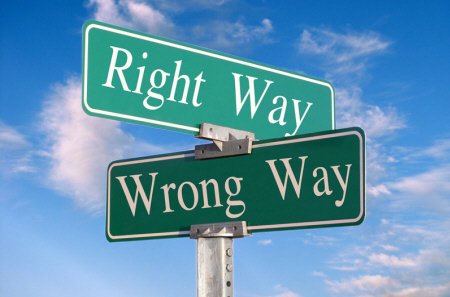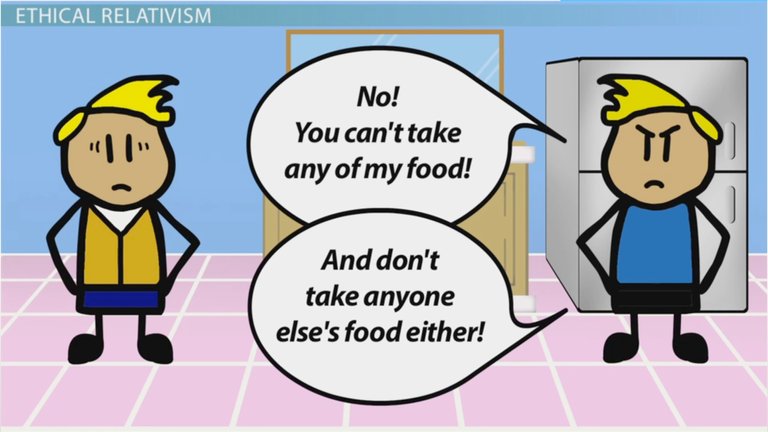
In order to carry out this study on this type of ideology present in our current society, it will be divided into seven parts, which will be seven publications to analyze the topic of Ethical Relativism:
- Introduction and definition
- Characteristics
- Types
- Reviews
- Theoretical differences between the social sciences and ethics
- Justifications for ethical relativism
- Conclusions
Image Source 1
- PART 1A: Introduction
Relativism is a philosophical theory initiated by the Sophists themselves and considers that the truth is in relation to the subject who believes to have it, as opposed to the objectivist theory that maintains that the truth is independent of the people who formulate it, and therefore can be known.
We must be careful and try not to confuse relativism with the existence of different opinions on the same fact. Relativism would arise if the people who maintain them affirm that these opinions are true.
Although relativism may be applicable to any aspect of cognitive life, it was in the realm of morality and politics that it had the most impact at that time, because it had in its favor the decline of the Athenian aristocracy and the rise of democracy . All this supposed that the aristocratic traditional values
were very criticized, mainly by the emergent youth, and they were replaced by a new axiology.
This relativist position was much criticized by Socrates, a contemporary of The Sophists, and by Plato, his disciple, on understanding that this theory, in addition to being absurd, makes knowledge impossible, as it affirms the inexistence of truth. Relativism was also criticized for the consequences on the moral and political level, to understand its detractors that degraded the life of the city.
Since then, relativism has been present in the social debate, and it can be affirmed that there are people who show themselves relativist in the ethical plane, for example, and ensure to be objectivist in the field of natural science.

Image Source 2
- PART 1B: Definition
Ethical relativism is the theory conception that holds that there is no absolute universal rule in the morality and integrity of society. Consequently, it is argued that the ethical action of an individual depends or is relative to the society to which it belongs.
It is also cited as epistemological relativism, since its basic idea is that there are no universal truths about the world, only different ways of interpreting it. This goes back to Greek philosophy, where they worked with the phrase "man is the measure of all things".
Subsequently, more contemporary affirmations followed, such as that truths are subjective depending on the point of view of those who analyze them, or that for each culture there are different types of agreement.
There are also positions towards the scientific that seek to be objective and logical, called relative - ethical truths. From these considerations comes moral relativism, the theory that there are no absolute, objective and moral truths universally binding. The ethical relativist denies that there is any objective truth about right and wrong.
Ethical judgments are not true or false, because there is no objective truth that is adequate for a moral judgment.
It can be seen that, for these authors, morality is relative, subjective, and not binding, therefore, moral or ethical opinions, which may vary from person to person, are equally valid and no opinion of "the good and the bad "is really better than another and it is not possible to order moral values
thanks to hierarchical classification criteria. Next to cultural relativism, this vision is opposed to that of moral universalism.
That is, relativism postulates that no knowledge or moral principle is true regardless of the opinions of people or their circumstances, nor, for that same reason, is valid for everyone at all times and places.
Thanks for Reading, and until next time.
- Follow me @wfuneme
- Upvote https://steemit.com/philosophy/@wfuneme/what-is-ethical-relativism-are-ethical-and-moral-rules-universal-or-local-part-1-introduction-and-definition
- Resteem https://steemit.com/philosophy/@wfuneme/what-is-ethical-relativism-are-ethical-and-moral-rules-universal-or-local-part-1-introduction-and-definition
What's up @wfuneme,
Your post "¿WHAT IS ETHICAL RELATIVISM? ¿ARE ETHICAL AND MORAL RULES UNIVERSAL OR LOCAL? ◼ Part 1 / Introduction and definition" hast just been Resteemed !!! 🙂😉🙂
By following me, you have achived this service.
😝🙂😝 Best regards, free resteeme. @tow-heed😉😉😉